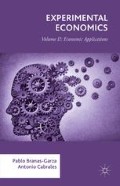Abstract
Voting and elections play dual roles as social choice systems. On the one hand, they act as a preference aggregation system: they are used to choose between different alternatives when citizens do not agree on their preferred choices. On the other hand, they act as an information aggregation system: when individuals share the same preferences but each has only partial information on the state of the world, a voting system can be used to aggregate the decentralized information, increasing the probability of choosing the best alternative.
Access this chapter
Tax calculation will be finalised at checkout
Purchases are for personal use only
Preview
Unable to display preview. Download preview PDF.
Editor information
Editors and Affiliations
Copyright information
© 2016 Humberto Llavador and Robert Oxoby
About this chapter
Cite this chapter
Llavador, H., Oxoby, R. (2016). Experiments in Political Economy. In: Branas-Garza, P., Cabrales, A. (eds) Experimental Economics. Palgrave Macmillan, London. https://doi.org/10.1057/9781137538161_9
Download citation
DOI: https://doi.org/10.1057/9781137538161_9
Publisher Name: Palgrave Macmillan, London
Print ISBN: 978-1-349-56046-2
Online ISBN: 978-1-137-53816-1
eBook Packages: Economics and FinanceEconomics and Finance (R0)

